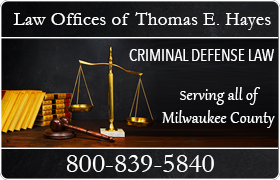 Milwaukee County, WI Juvenile Law Lawyers
Milwaukee County, WI Juvenile Law Lawyers
Sponsored Law Firm
-
 x
x

Click For More Info:
-
Law Offices of Thomas E. Hayes
161 W Wisconsin Ave Suite 3032 Milwaukee, WI 53203» view mapMilwaukee County Criminal Defense Over 30 Years of Experience
Clients should be comfortable with their lawyer. I am the only one who "works" my cases. My work ethic is efficient result oriented.
800-839-5840
Lawyers
1-1 of 1 matches




 Thomas Hayes Milwaukee, WI
Thomas Hayes Milwaukee, WI Contact UsRequest Consultation Now
Contact UsRequest Consultation Now Law OfficeLaw Offices of Thomas E. Hayes
Law OfficeLaw Offices of Thomas E. Hayes